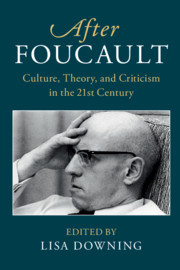Book contents
4 - Foucault's Biopower
from PART I - GOING AFTER FOUCAULT
Published online by Cambridge University Press: 30 May 2018
Summary
Introduction
When reflecting on his earlier works Discipline and Punish and the first volume of The History of Sexuality, Michel Foucault commented that ‘the question at the center of everything was: what is power? And to be more specific: how is it exercised, what exactly happens when someone exercises power over another?’ He exposed the complexities associated with assembling answers to these questions when he engaged analytically with the discursive and institutional traces inscribed by multifaceted relations of power on ‘the living’. Following Foucault's analyses of the multiple relations, networks, and mechanisms of power, through which conduct is governed, action is structured, and forms of subjectivity are constituted, a notion of ‘biopower’ and an associated term, ‘biopolitics’, have become prominent for discussions of his work and in subsequent analyses of the administration of life and government of the living. The primary focus of this chapter is these interrelated notions of biopower and biopolitics, notions that are of considerable import both for understanding the development of Foucault's work and for trying to make some sense of the complex, species-entangled world in which we live. We seek to take issue with anthropocentric conceptualizations of biopower by suggesting that both Foucault's own, and much current, thinking has failed to adequately address ‘the fundamental biological fact that human beings are a species’. This is exemplified by the relative neglect in his work of human and non-human animal species relations, which often resemble ‘states of domination’, as we will explore in the concluding sections of the chapter.
Modern civilization has generated ‘the most complex system of knowledge, the most sophisticated structures of power’. Power, in Foucault's terms, is relational and relations of power are multiple and exist everywhere. It is to the various ways in which Foucault considers power is manifested and exercised that our attention is initially directed. Given that Foucault's consideration of relations of power extends across the complex interconnections among sovereign, disciplinary, and biopolitical forms, we contemplate (1) the juridical framework of sovereign power, as well as disciplinary technologies of power. We then proceed to consider (2) the loose designation of the ‘new technology of power … biopolitics … biopower’, including the development of a series of ‘apparatuses’ through which power is exercised over life, where ‘life’ appears to be species-specific, and is addressed in terms of human forms alone.
- Type
- Chapter
- Information
- After FoucaultCulture, Theory, and Criticism in the 21st Century, pp. 61 - 76Publisher: Cambridge University PressPrint publication year: 2018
- 4
- Cited by

